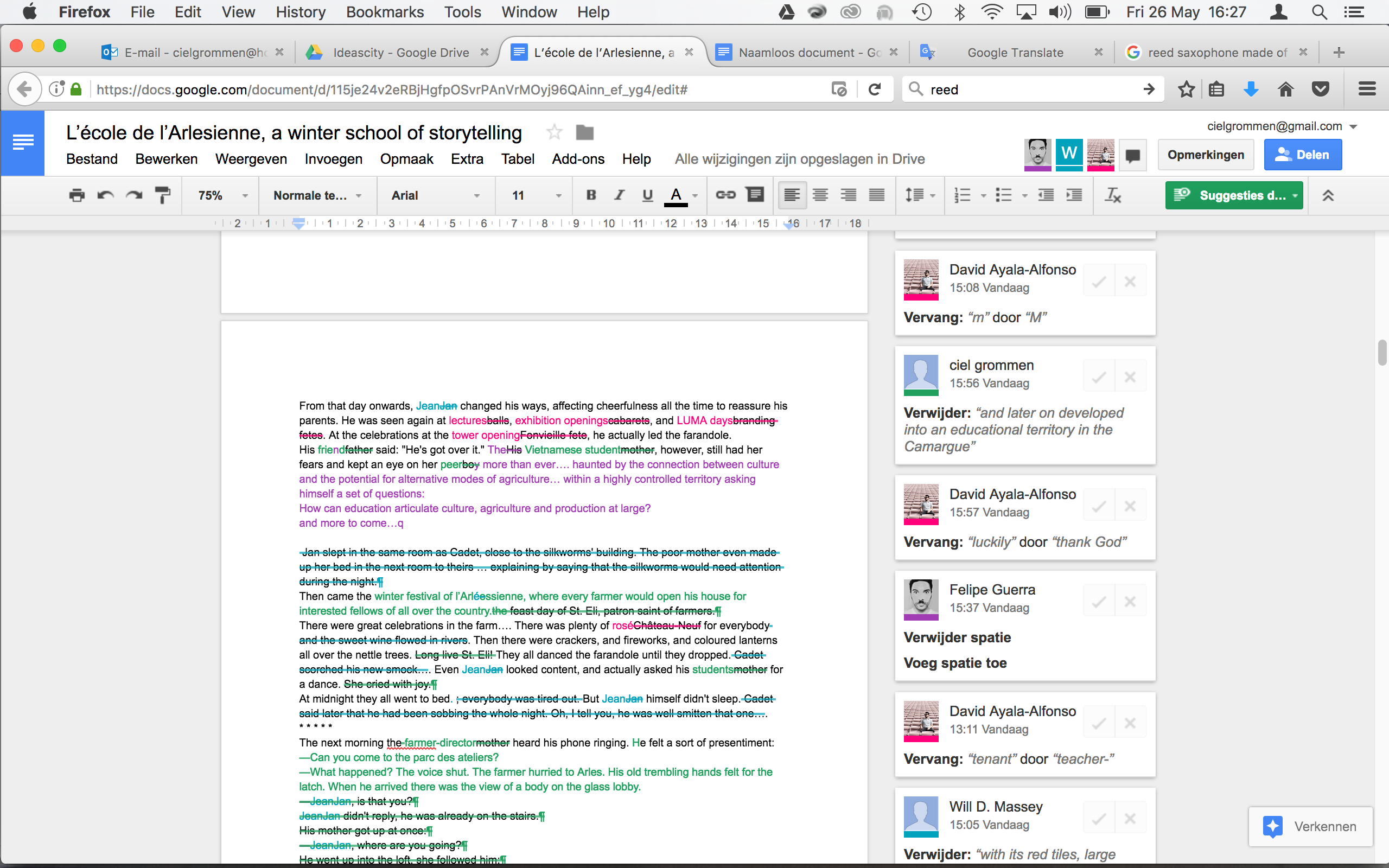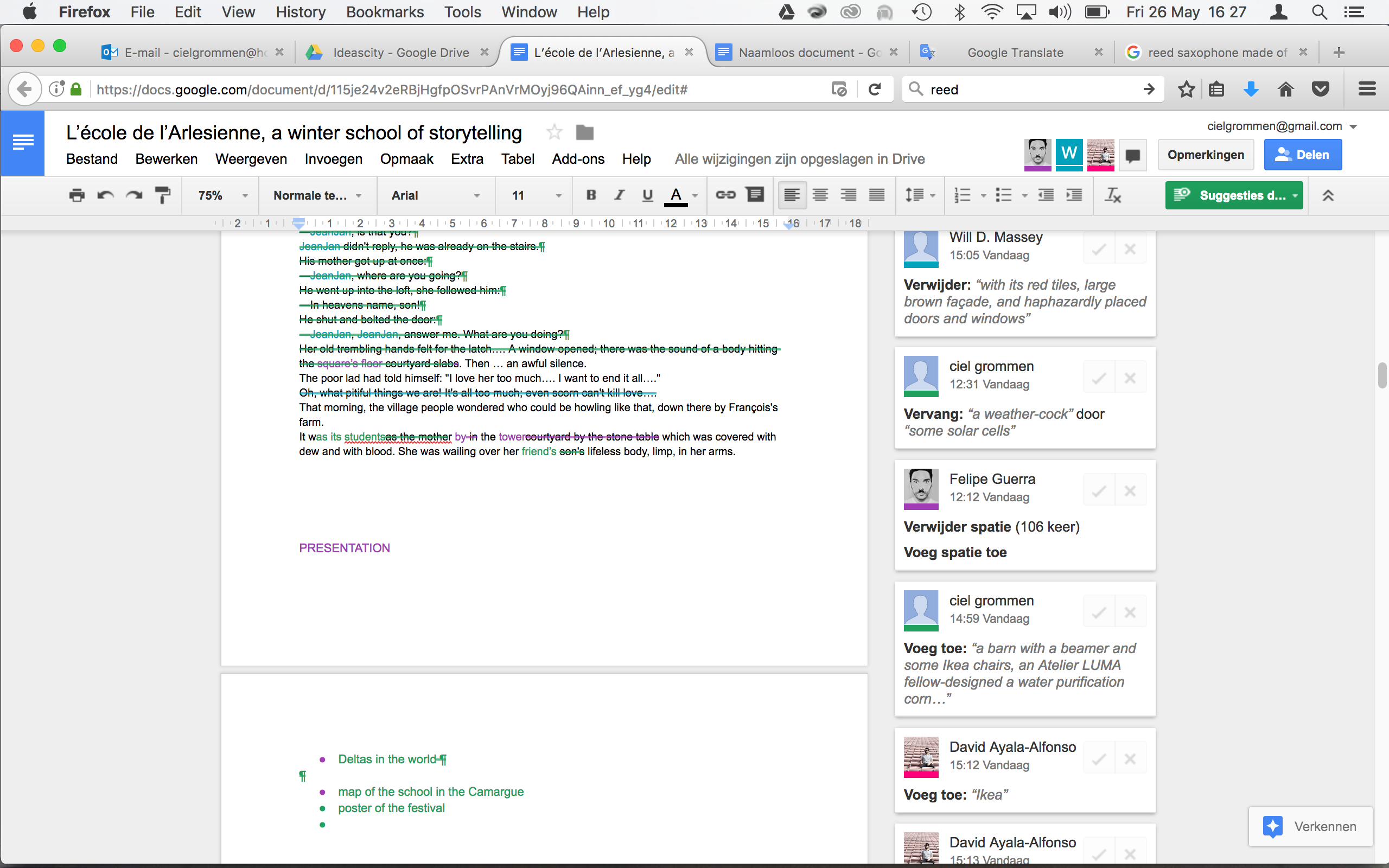L'Arlésienne, is a proposal of William Massey, David Ayala-Alfonso and Felipe Guerra and myself, produced in the framework of Ideascity Arles in 2017.
We were asked to reflect on the idea "the city as a campus", on which we did not agree. As a counterproposal, we presented “a winter school of deltas", a decentralised school system, taking place in winter months, in which each year a delta region of the world is highlighted through the artistic forms of storytelling.
We did not present this proposal in a conventional way. Instead we used it as a background of a story. The story we were telling was a new version of l’Arlésienne. L’Arlésienne was written by Alphonse Daudet in 1869. It is a famous love story that has led to a famous expression in French language: L’Arlésienne, referring to someone or something much expected, but that never comes...
We did not present this proposal in a conventional way. Instead we used it as a background of a story. The story we were telling was a new version of l’Arlésienne. L’Arlésienne was written by Alphonse Daudet in 1869. It is a famous love story that has led to a famous expression in French language: L’Arlésienne, referring to someone or something much expected, but that never comes...



L'Arl(uma)sienne
As you go down to the village, passing the Zac des Minimes, that site that luckily never developed into a ‘city as campus’, the road brings you to the Delta region of the Rhone river, also known as the Camargue. It is a typical Provence house with some solar cells right on top of the loft, a barn with a beamer and some Ikea chairs and an Atelier LUMA designed water purification corner. This little house is rented in the summer through airbnb, but at this winter moment used for student housing.
Yesterday, around midday, I was walking back from the village, when I saw some student-farmers from the winter school of deltas quietly finishing loading Cannes de Provence on a prototype car in front of the farm. The gate had been left open and I discovered an old man at the back of the yard, with his head in his hands. One of the men whispered to me:
— It's the main farmer. He's been like that since his colleague’s death.
At that moment a Vietnamese student and a small boy from the village, accompanied by sun-tanned tourists, passed near us and went into the farm.
The man went on:
—The lady and the youngest are coming back from the museum. Every day it's the same thing since the farmer-teacher killed himself. Then I learned all about the tragic story of young Jean.
*****
Jean was an admirable countryman of twenty, as well-behaved as a Parlésien, well-built and open-hearted. He was very handsome and so caught the eye of lots of women, but this farmer-teacher had eyes for only one —a petite girl living in Arles, whom he had once met in a storytelling class.
This love wasn't well received at first in the farm. The girl was known as an artist, and her parents weren't local people.
But Jean wanted her, whatever the cost. He said:
—I will die if I don't have her. And so, it just had to be. The marriage was duly arranged to take place after the end of the winter school’s final presentations.
One Sunday evening, the farmers were just finishing dinner in the courtyard. It was almost a LUMA feast. The girl was not there, but her creativity and well-being were toasted throughout the meal.... A man appeared unexpectedly at the door, and stuttered a request to speak to Francois, the main farmer of the place.
—Monsieur, the man said, you are about to marry your teacher off to a woman who has won the Monsanto Art Award. I have proof of what I say; here are some of her tweets.
—I see, said Francois, come in; have a glass of rosé.
The man replied:
—Thanks, but I am too upset for company.
And he went away. That evening, François went out into the fields with his teacher, Jean.
*****
Jean didn't mention the Arlésienne ever again. He still loved her though. Sometimes, he would spend entire days alone, motionless, without being bothered about the rehabilitation of underused infrastructure in the Camargue.
At other times, angry, he would set himself to work on the farm and telling the story of water management to international students from Delta regions all over the world at the école de l'Arlésienne.
When evening came, he would set out for Arles, and walk expectantly until he saw the tower appearing in the sunset. Then he turned round and went home. He never went any closer than that. The people collaborating in the school didn't know what to do, seeing him always sad and lonely. They feared the worst. Once, during a meal, his mother, her eyes welling with tears, said to him:
—Alright, listen Jean, if you really want her, we will let you take her....
Jean shook his head and left....
From that day onwards, Jean changed his ways, affecting cheerfulness all the time to reassure his peers. He was seen again at lectures, exhibition openings and LUMA days. At the celebrations at the tower opening, he actually led the farandole.
His friend said: "He's got over it." His Vietnamese student, however, still had her fears and kept an eye on her peer more than ever...
Discussions in this educational region for alternative modes of agriculture, became to turn around the question: how can agriculture take advantage of a cultural economy?
Then came the Winter Festival of l’Arlésienne, where every farmer would open his house for interested fellows of all over the world. There were great celebrations in the farm.... There was plenty of rosé for everybody. Then there were crackers, and fireworks, and coloured lanterns all over the nettle trees. They all danced the farandole until they dropped..
Even Jean looked content and actually asked his Vietnamese student for a dance. At midnight they all went to bed; everybody was tired out. But Jean himself didn't sleep.
****
The next morning the farmer-director heard his phone ringing. He felt a sort of presentiment:
—Can you come to the Parc des Ateliers?
—What happened? The voice shut. The farmer hurried to Arles. His old trembling hands felt for the latch of the car. When he arrived there was the view of a body on the glass foyer.
Then ... an awful silence.
The poor lad had told himself: "I love her too much.... I want to end it all...."